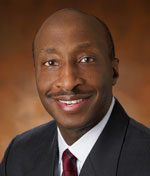 |
| Merck CEO Kenneth Frazier |
Merck & Co.'s ($MRK) CEO Kenneth Frazier expects his company to be a player in the lucrative hepatitis C market again with the anticipated approval this month of its hep C candidate. That, along with some M&A deals and growth in oncology should propel the world's fourth largest drugmaker forward for some time, he said this week.
The FDA is expected to decide by Jan. 28 if it will approve Merck's entry into the market for next-gen hepatitis C meds, drugs that can cure most patients without the side effects that were tied to older meds made by Merck and others. That market right now is dominated by Gilead Sciences' ($GILD) Sovaldi and Harvoni, as well as AbbVie's ($ABBV) Viekira Pak. Gilead Sciences already reaps billions from its hep C meds, and this week the FDA granted its newest combo med status for a quick review.
Frazier is undaunted, however. Speaking this week at the Goldman Sachs Global Healthcare Conference, he said Merck will have key place in that lucrative market, the Associated Press reports.
"We believe we can go head to head with Harvoni," Frazier told the group, the AP reported. "I don't think people have gotten their heads around how big this field could be."
But with the impending loss of patent protection cholesterol drug Zetia, its number 2 seller with about $2.5 billion in sales, Merck is going to need more than a late to market hep C med to propel growth.
Frazier points to Keytruda, Merck's immuno-oncology drug that is being pegged at $5 billion in peak sales. Already approved for treating melanoma and the most common form of lung cancer, Merck is studying the drug for use in 30 more tumor types. The AP points out that Credit Suisse has said the immuno-oncology market could grow to $42 billion annually.
Frasier also said Merck will be active in the M&A this year, particularly in finding deals that can fill in gaps in its pipeline. "I am very eager to look for opportunities to augment our pipeline," he said. "There's no way we can invent enough stuff for a company of Merck's size."
- read the AP story